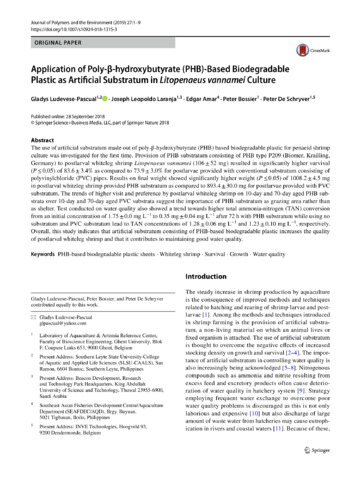Application of poly-β-hydroxybutyrate (PHB)-based biodegradable plastic as artificial substratum in Litopenaeus vannamei culture

Tingnan/Open
Petsa
2019May-akda
Page views
620Metadata
Ipakita ang buong tala ng itemCited times in Scopus
Share
Abstract
The use of artificial substratum made out of poly-β-hydroxybutyrate (PHB) based biodegradable plastic for penaeid shrimp culture was investigated for the first time. Provision of PHB substratum consisting of PHB type P209 (Biomer, Krailling, Germany) to postlarval whiteleg shrimp Litopenaeus vannamei (106 ± 52 mg) resulted in significantly higher survival (P ≤ 0.05) of 83.6 ± 3.4% as compared to 73.9 ± 3.0% for postlarvae provided with conventional substratum consisting of polyvinylchloride (PVC) pipes. Results on final weight showed significantly higher weight (P ≤ 0.05) of 1008.2 ± 4.5 mg in postlarval whiteleg shrimp provided PHB substratum as compared to 893.4 ± 30.0 mg for postlarvae provided with PVC substratum. The trends of higher visit and preference by postlarval whiteleg shrimp on 10-day and 70-day aged PHB substrata over 10-day and 70-day aged PVC substrata suggest the importance of PHB substratum as grazing area rather than as shelter. Test conducted on water quality also showed a trend towards higher total ammonia-nitrogen (TAN) conversion from an initial concentration of 1.75 ± 0.0 mg L−1 to 0.35 mg ± 0.04 mg L−1 after 72 h with PHB substratum while using no substratum and PVC substratum lead to TAN concentrations of 1.28 ± 0.06 mg L−1 and 1.23 ± 0.10 mg L−1, respectively. Overall, this study indicates that artificial substratum consisting of PHB-based biodegradable plastic increases the quality of postlarval whiteleg shrimp and that it contributes to maintaining good water quality.
Suggested Citation
Ludevese-Pascual, G., Laranja, J. L., Amar, E., Bossier, P., & De Schryver, P. (2019). Application of poly-β-hydroxybutyrate (PHB)-based biodegradable plastic as artificial substratum in Litopenaeus vannamei culture. Journal of Polymers and the Environment , 27(1), 1-9. https://doi.org/10.1007/s10924-018-1315-3
Taxonomic term
Mga koleksyon
- AQD Journal Articles [1248]
